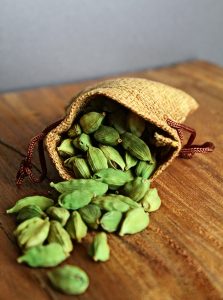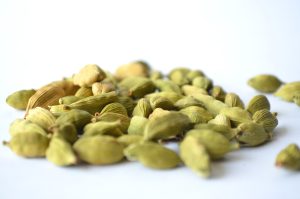
Cardamom is a spice that has been around for centuries. It is grown in many parts of the world. It is one of the most expensive spices in the world, and it has a unique flavor and aroma that sets it apart from other spices. The flavor of cardamom is often described as warm and sweet, with hints of citrus and pepper. It has a variety of uses, from culinary to medicinal, and even as a flavoring for drinks and desserts.
Benefits of Cardamom
The benefits of cardamom are numerous and include its ability to improve digestive health, reduce inflammation, boost the immune system, and even help with depression.
Cardamom is an excellent source of dietary fiber, which helps to keep your digestive system healthy. It helps to prevent constipation and promotes regularity, as it helps to move food smoothly through the digestive tract. Additionally, cardamom helps to breakdown toxins and waste in the body, thereby helping to improve digestion. It is also believed to be beneficial for people suffering from digestive disorders such as irritable bowel syndrome (IBS).
Cardamom is a powerful anti-inflammatory that can help reduce inflammation in the body. It has been found to have a powerful antioxidant effect, which helps to reduce the damaging effect of free radicals on the body. Studies have also shown that cardamom can reduce the activity of pro-inflammatory enzymes, which can help to reduce pain and swelling caused by inflammation. As such, cardamom can help to reduce inflammation associated with conditions such as arthritis and even cancer.
Cardamom has also been found to boost the immune system. It contains compounds that can help to stimulate the production of white blood cells, which are responsible for fighting off infections. Additionally, it has been shown to increase the activity of certain immune cells responsible for destroying bacteria, viruses, and other foreign bodies. As such, cardamom can help to protect the body from infections and disease.
In addition to its physical benefits, cardamom has been found to possess certain psychological benefits. Studies have found that cardamom can help to reduce stress and anxiety levels, which can help to improve mood. Additionally, it has been found to have a calming and soothing effect, which can help to reduce irritability and depression. As such, cardamom can be used to help improve mental health.
History of Cardamom
Cardamom’s history is a long and fascinating one, and it is no wonder that it is still so popular today.
The first known use of cardamom dates back to ancient Egypt, where it was used to flavor foods and medicines. It was highly valued, and was even used as currency in some areas. Cardamom was also used in religious ceremonies, and it was believed to have magical powers.
In the Middle Ages, cardamom spread to Europe, where it was used in both food and medicine. It was particularly popular in Germany, where it was often added to beer and other drinks. By the 18th century, cardamom had spread to North America, where it was used in baking and for flavoring coffee.
In India, cardamom was used as a medicine for centuries, and it is still used in Ayurvedic medicine today. Cardamom is believed to have many health benefits, including helping to reduce inflammation and improve digestion. It is also used to help alleviate nausea and sore throats, and to relieve chest pain and congestion.
The two main varieties are green and black cardamom. Green cardamom is the most widely used type, and it has a sweet, lemony flavor. Black cardamom has a smokier, more pungent flavor, and it is used mainly in savory dishes.
In India, cardamom is an important part of the cuisine, and it is often used in curries, rice dishes, and desserts. It is also used to flavor chai tea and masala chai, the popular spiced milk tea. Cardamom is also a popular flavoring in Middle Eastern desserts, such as baklava and halvah.
Cooking with Cardamom
Cardamom is one of the most popular spices used in Indian cuisine. It is often added to curries, stews, chutneys, and other savory dishes. Cardamom has a strong, spicy flavor that adds depth to any dish. It is also used to make masala chai, one of the most popular teas in India. Cardamom is often combined with other spices such as cinnamon, cloves, and ginger to add flavor to the tea.
In addition to savory dishes, cardamom can be used to make sweet treats as well. Cardamom is a key ingredient in many Middle Eastern desserts such as baklava and kanafeh. Cardamom adds a unique, sweet-spicy flavor to these desserts that is sure to please. It can also be used to make a variety of breads and pastries, such as cardamom buns and cardamom rolls. Cardamom is also a popular addition to cakes, cookies, and other sweet treats.
Cardamom can also be used in drinks. It adds a unique flavor to hot and cold drinks alike. A popular way to enjoy cardamom is in golden milk, which is made by blending milk, honey, spices, and cardamom. Cardamom can also be used to make flavored coffee or tea. Simply add cardamom to a cup of hot coffee, tea, or chai for an exotic and flavorful experience.
Cardamom can also be used to make a variety of spice rubs, sauces, and marinades. Mix some cardamom with other spices such as cumin, coriander, and turmeric to create a flavorful blend that can be used on meats, fish, and vegetables. Cardamom is also a great addition to marinades and sauces to add a unique flavor and aroma to any dish.

Clinical Studies on Cardamom
Multiple studies have been conducted to examine the effects of cardamom on heart health. One study found that cardamom may help improve blood flow and reduce cholesterol levels and triglyceride levels in individuals with coronary artery disease. Another study found that cardamom may be beneficial for reducing risk factors for heart disease such as high blood pressure, high triglyceride levels, and low HDL cholesterol levels.
Cardamom may also be beneficial for individuals with diabetes. Several studies have investigated the effects of cardamom on diabetes. One study found that cardamom extract may help to regulate blood sugar levels and reduce insulin resistance in individuals with type 2 diabetes. Other studies have found that cardamom may help to reduce fasting blood glucose levels and HbA1c levels, which are markers of long-term blood sugar control.
Studies have also looked into the potential anti-cancer properties of cardamom. One study found that cardamom extract may help to reduce the growth of certain types of cancer cells in the laboratory. Other studies have found that cardamom may have anti-inflammatory and antioxidant effects, which may make it useful in battling the oxidative stress associated with the development of cancer.